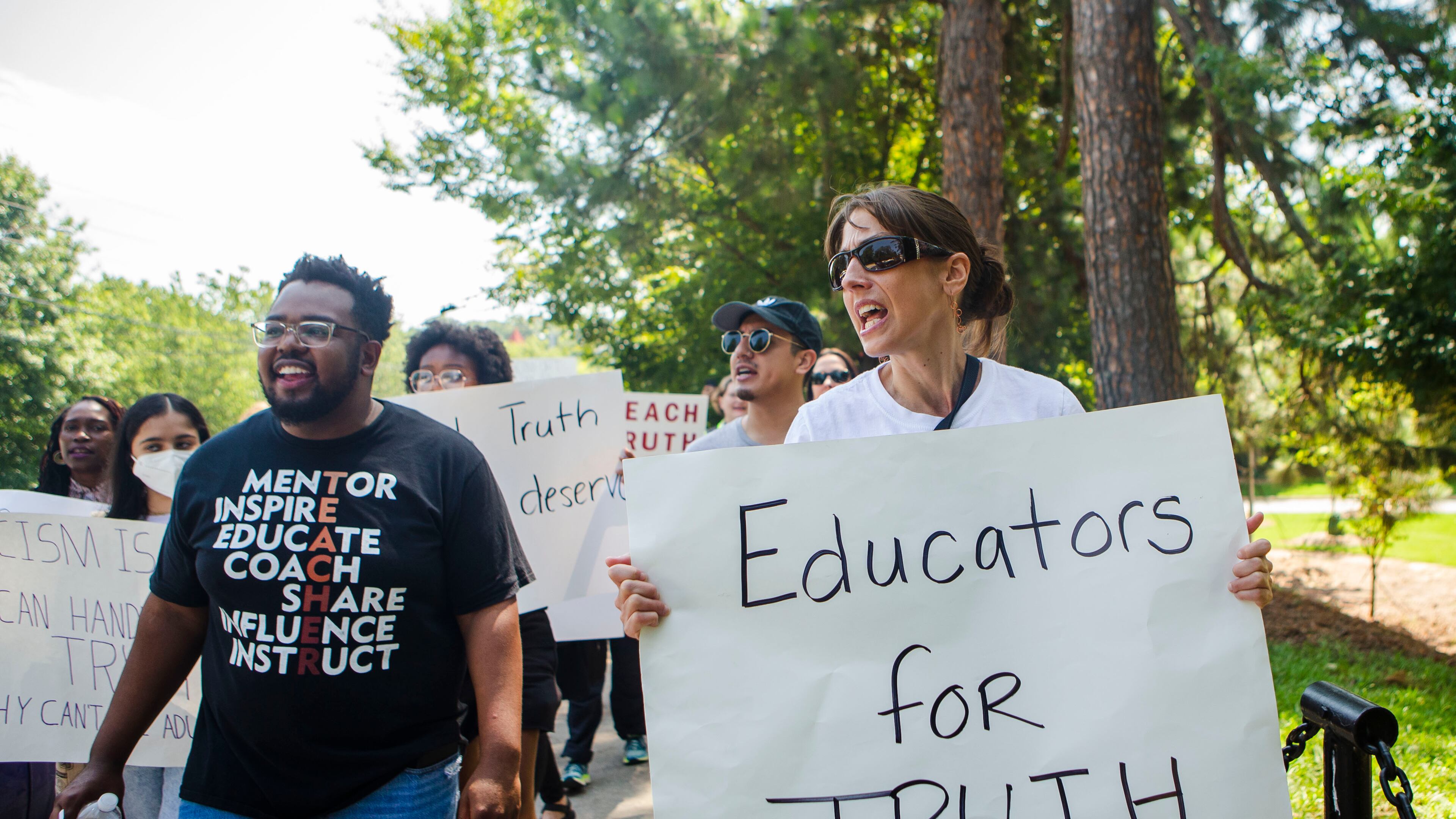Opinion: Democracy requires full teaching of U.S. history

Five local teachers in the K16 Teach Truth Network joined forces to write a guest column on their concerns about the new Georgia ban on divisive concepts in the classroom.
K16 Teach Truth is a coalition of public school educators and others who aim to defend and even expand equity-centered education for students from kindergarten through college seniors. The groups involved in the collaboration include Gwinnett Educators for Equity and Justice, Cobb’s Stronger Together, Beacon Hill Black Alliance for Human Rights, and the United Campus Workers of Georgia, Local 3265.
Opposed by education and civil rights groups, the new Georgia law passed this year says teachers cannot “advocate for” nine concepts involving America’s racial history that lawmakers define as divisive. Parents can file a complaint with the school principal, triggering a review process that could make its way to the state school board.
Critics of the law say it will lead to avoidance of discussions of race and racism as teachers seek to avoid complaints.
By Dawn Bolton, Jonathan Peraza Campos, Anthony Downer II, Paul McLennan, Bekah Ward
“I have a right to know my history,” said a high school senior, Kayla, at one of many rallies she attended last spring. Despite students, teachers, parents, and community members mobilizing for honest and robust education in our public schools, Georgia enacted a ban on “divisive concepts” in our classrooms.
But Kayla and her fellow students are not done fighting. Ana helped organize a Truth Walk in Decatur in June that ended at the newly renamed Beacon Hill Middle School. She spoke about the law’s impact: “Teachers will be forced to censor themselves … this will only serve to miseducate students.”
At this point, 36 states have attempted to restrict teaching truth about ongoing racial injustice — the same injustice that compelled an estimated 15 million to 26 million people to protest in 2020 after the killing of George Floyd.
These laws are nothing new. The psychological genocide and suppression of education at the heart of these laws are also the linchpins of white supremacy. Europeans have used cultural imperialism to separate minoritized people from their cultures, histories, and ultimately, themselves.
Enslaved Africans were banned from speaking their native tongues. After enslaved people rose up in the Stono Rebellion of 1739 in South Carolina, they were forbidden from reading and writing. They risked lynching and torture to do so. Across the North American empires, from Indigenous communities to Puerto Ricans to Filipinos, youth were forced to attend boarding schools to assimilate into European culture and endure untold physical and sexual abuse.
After the Civil War, newly emancipated Black people built schools and universities. They were often burned. The United Daughters of the Confederacy, founded in 1894, began a propaganda campaign to enshrine their interpretations of history. They authored textbooks printed by publishing companies under their command and approved by supportive boards of education. They funded monuments and memorials to commemorate European invaders and Confederate traitors. They used the public’s tacit consent to develop the white supremacist curriculum standards we have today.
During the 1920s, Carter G. Woodson inspired a network of “fugitive pedagogists,” Black educators who taught Black history during Jim Crow. The educators of today are also committed to teaching the truth. As educators, we choose to not just teach academics, but to guide students to recover their sense of self, think critically, and become world changers. To do that, students need real knowledge.
As a baby boomer, teacher Dawn Bolton says she was not educated about African American or Native American history. Her authentic education began as a young graduate student. She was cheated because the school system taught a sanitized version of our history.
Growing up as a first-generation, U.S.-born son of a Salvadoran immigrant, Jonathan Peraza Campos attended some of the most segregated school systems in the North and the South, where he was denied learning about his history. In learning the truth about his people and those of kindred struggles, he became committed to transforming himself and others through education that emphasized justice and collaboration. He has witnessed young learners step into their power as they are exposed to Latino heroes and legacy.
The K16 Teach Truth Network has given testimony at hearings, held rallies at the Capitol, in Decatur and Piedmont Park. We took these actions in solidarity with each other and in defense of our public schools. We marched in defense of the truth because we believe that the truth will set us free.
Teaching truth helps students of color to finally be seen and affirmed. As a result, white youth see us in all of our humanity. We all have the opportunity to learn about historical role models, such as John Brown, Yuri Kochiyama and Kwame Nkrumah, who worked in coalitions to build a better world.
Why are legislators so invested in banning the teaching of Black contributions to this country as well as the legacy of slavery and white supremacist violence? Why do they want to erase the reality that white, Black, brown, Asian, and Indigenous communities have always resisted injustice and fought for all of our civil and human rights?
Throughout history, minoritized people have always organized our communities, spoken out against injustice, built institutions, and changed the world with our art and culture. Young people of all backgrounds in Georgia have nothing to lose and so much to gain with a truthful, multicultural education.
Only enemies of democracy will ban the teaching of truth in our classrooms. It is time for Georgia to affirm and celebrate all of its residents and prepare its youth to fully participate in this diverse world.

